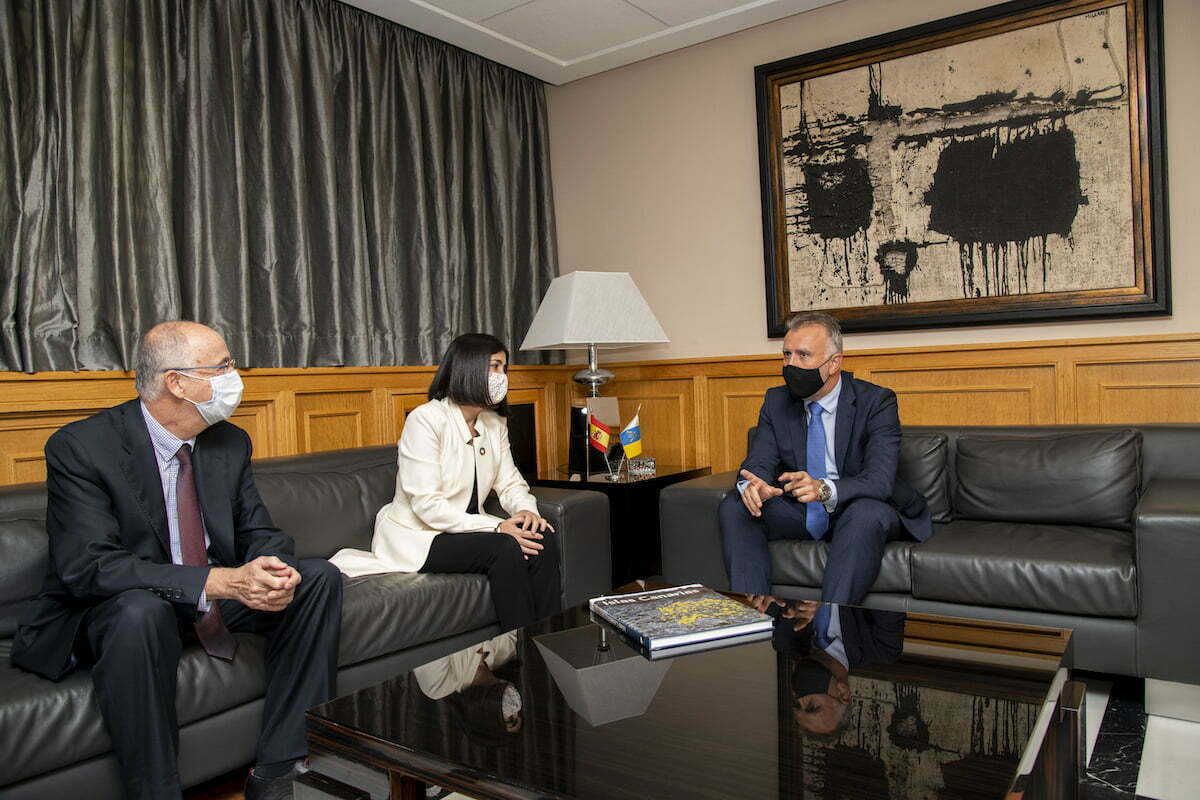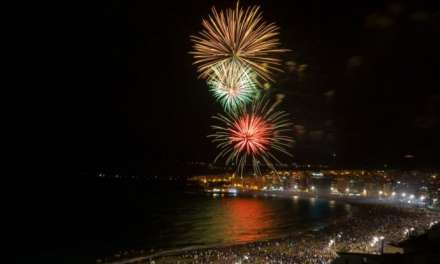Spain’s Minister of Territorial Policy and Public Function, Carolina Darias, announced this Friday, during a press conference alongside the president of the Canary Islands, Ángel Víctor Torres, that the Government of Spain will reinforce immigration policy in the Canary Islands with greater resources and vigilance to deal with the migration crisis, with plans to designate transfer of land for usage in the processing of those that arrive and increased diplomacy with countries from which migrants depart. They will continue to focus on swift repatriations for any arrivals who do not qualify for the right to remain.
The Regional President confirmed that these measures will be added to those that are already being undertaken to try to cope with the constant arrival of irregular vessels by sea over the last year, which has led to much consternation in recent weeks, particularly on Gran Canaria. The President was emphatic that the Canary Islands response must be reinforced because “we cannot do it alone,” he said, pointing out that it is essential surveillance measures are increased, that Frontex and that security resources are deployed at source, “because they are key to fighting the mafias.” He appreciated that more state-owned facilities are being urgently made available, as well as the intensification of coordination and diplomatic relations, with upcoming trips for the Interior Minister to Morocco, and of the Minister of Foreign Affairs to Senegal.
Darias, speaking on behalf of all the central government ministries involved in immigration reinforcement measures, indicated that their objective is to effectively respond to the migration crisis phenomenon, which has seen a now 900% increase compared to last year, with the arrival of open boats, known as pateras, having already brought more than 16,000 migrants to the Archipelago so far in 2020.
She pointed out that the Atlantic route has increased significantly, now representing 57% of all irregular arrivals into Spain. Following, Minister of the Interior, Fernando Grande-Marlaska’s visit and announcement last Friday more than 2,300 people reached the coasts of the archipelago that weekend alone, November 6 – 8. Grande-Marlaska plans to travel to Morocco on November 20 to “reinforce ties”, Darias said, and gain better control on the undocumented and unhindered departures that are taking place.
The minister added that Marlaska has also traveled to African countries including Algeria, on three occasions; Ivory Coast, twice; Gambia; and Morocco, six times, among others to ensure communication and collaboration in trying to stem the migratory flows that result in so many arrivals to these shores. She added, that the more than €200 million made available, for countries that collaborate in the development of these projects, will also be maintained.
The Ministry of Interior are increasing troop capacities and detachments of State Security Forces with two more ocean-going vessels, a high-speed patrol vessel, an airplane, a helicopter and even a submersible vessel.
A Frontex, EU Border Force, team was deployed on November 4 to Las Palmas de Gran Canaria and will remain until at least and January 21, 2021, in order to combat the fight against human trafficking, as a “priority objective” of the central government and European Union.
The deployment of air resources over the Atlantic route is also being negotiated with Senegal, for 2021, to further reinforce existing monitoring operations to curb the migration crisis.
Temporary Attention Centre for Foreigners, at Barranco Seco in Las Palmas de Gran Canaria
A Temporary Attention Centre for Foreigners (Centro de Atención Temporal de Extranjeros – CATE) in the area of the Barranco Seco military facilities, in Las Palmas de Gran Canaria, will soon be operational where the Army has erected a camp to provisionally accommodate up to 800 people at a time, during the first 72 hours after their arrival. There has been some question over how many bed spaces have been included at the facility, where bunks for just 200 have initially been sited.
28 Civil Guard agents are currently in Mauritania and, together with the Mauritanian authorities, are carrying out constant air, sea and land patrols using two support patrol boats, an ocean-going vessel, helicopters and an airplane.
In Senegal, Spain has 15 Civil Guard agents, from the maritime service, with two vessels, a liaison officer and three Policia Nacional agents; who have been working with others in Morocco to exchange information, improving police collaboration and cooperative surveillance.
In Mauritania, an investigation team has been in situ since 2008, made up of 6 Spanish agents and 6 Mauritanians, who investigate illicit human trafficking, while in Niger there is also an investigation team carrying out similar work.
More money for cooperation
The central government budget for 2021 includes a 19% increase, of €500 million, for the Foreign Ministry to improve cooperation, bringing the total to €3.1 billion. The Minister for Foreign Affairs, European Union and Cooperation, Arancha González Laya, soon plans to travel to Senegal to further address issues surrounding migration.
Transfer of Facilities
The Ministry of Migration have been granted the transfer of various Defence Ministry facilities to enable the accommodating of migrants who have arrived on the coasts of the Canary Islands archipelago.
The Ministry of Defence has definitively ceded management of El Matorral, on Fuerteventura, to the Ministries of the Interior and Migration; on Tenerife, together Las Canteras barracks and the Las Raíces barracks will also be opened temporarily for the installation of tents, offering much greater capacity.
On Gran Canaria, in addition to the Barranco Seco facility, the Las Palmas de Gran Canaria City Council has granted the León school “imminently” once works that were being carried have been completed.
All in order for the Port of Arguineguín to be able to return to its regular uses, although no date and time have yet been set, Darias made clear that it will be “as soon as possible”.
Legal advice
Darias clarified that coherent legal advice for migrants is a priority for the Government of Spain, and emphasised that people who are deemed to be in a vulnerable situation will continue to be referred to the Peninsula, while those who are not will continue to be repatriated as expediently as possible. She referred to the fact that this week the first repatriations have been carried out and made clear there will likely be many more to follow. Darias also explained that the migration crisis phenomenon is a “moral and humanitarian challenge” of real scope that must be overcome using both “national and European” policy in the face of shocking images of shipwrecks and repeated loss of life.
The Canary Islands cannot become “a wall”
The president of the Canary Islands, Ángel Víctor Torres, thanked the Minister for answering “so many questions” with up to 1,000 people known to have lost their lives already this year on the Atlantic route, while 16,064 migrants have reached the Archipelago so far, including 1,665 minors, although he expressed concern that the Canary Islands cannot simply become “a wall” to migration or “a prison”, because the islands are fully a part of Europe. Torres was encouraged that both Marlaska and González Laya are travelling to Morocco and Senegal, respectively, as well by the minister’s assurances that surveillance measures to capture, prosecute and convict people trafficking gangs will be increased.
He said it is necessary to activate repatriation mechanisms in accordance with the existing agreements signed, always respecting human rights, at the same time, he asked that the granting of visas be simplified; as well as urging that humanitarian corridors be established making clear that any migration that reaches the Canary Islands “reaches Europe.”
Ángel Víctor Torres sent a clear message to public officials and society as a whole that the migration crisis phenomenon must be separated from party politics. He declared that xenophobia, racism, false information, fake news and fanaticism must be fought against and prosecuted saying “No one can remain impassive in the face of racism.” He alluded to “the mother who lost her baby in a shipwreck in the Mediterranean,” last week “which must stir [our] consciences. Scenes like that reach [into] the guts of those of us who are children and parents”.













